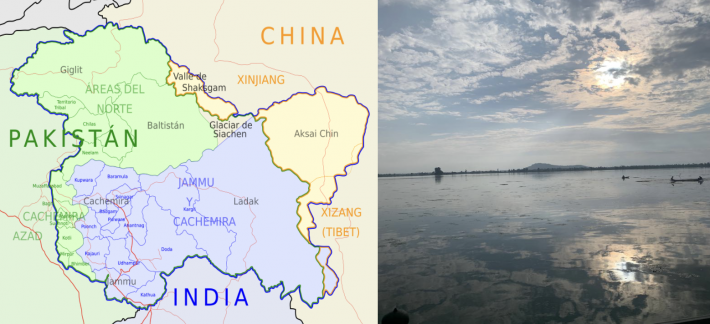‘Where is that located’ they say whenever I share where I come from. Kashmir is not just my homeland; it is my identity. Jammu and Kashmir have been a subject of political dispute since 1947, since the partition of India. It has been experiencing a conflict due to rivalry between India and Pakistan- both nuclear solid armed states. Yet, I only seem to find my peace in Kashmir. With its beautiful nature, the warm-hearted and welcoming environment, Kashmir is not just home for me but paradise on Earth. Kashmiris have become so adaptable because of the political turmoil that it has now normalized.
To understand the roots of Kashmiris, it is important to consider that we belong to central-Asian descent and have our unique language deeply related to our traditions, unlike the Indian-Aryan descent. But what is the main cause of the conflict? After the Hindustan partition (India and Pakistan were divided between two countries in 1947) post-British colonization, India and Pakistan claimed Kashmir to be theirs. As a result, Kashmir is divided into three parts: India occupies 45% of the Kashmir valley, leaving 35% to Pakistan- and the People’s Republic of China (PRC) controls the remaining 20%. However, in 1952 Prime Minister Nehru promised Kashmir a referendum to choose which state it wanted to be part of. However, this has yet to materialize and ever since the 1990s, Kashmir has become among the most militarized zone globally. Moreover, in 1958 the Indian Parliament granted special powers to the military to act against Kashmiri citizens if they demanded independence from India.
Another important aspect of the Kashmiri conflict dates back to the reign of Maharaja Hari Singh in 1947, who could not decide if Kashmir would accede to India or Pakistan. As a result, he requested time to reach an agreement whilst deploying Forces in Kashmir as temporary protection. This played the role of a tool of accession binding Kashmir to India, and even if the government of India controlled all internal affairs, full powers remained within India. The Indian Constitutions articles 370 and 35A granted this special status to Kashmir, limiting the Parliament’s authorities and maintaining somewhat autonomy in the region. But over the years, these articles were left as a symbol for us through amendments. On August 5th 2019, the Indian government unconstitutionally scraped articles 370 and 35A off the Constitution.
Just like every other Kashmiri, I am very attached to my homeland. Even after experiencing so much trauma and violence, we never fail to find peace at home. Keshmiri hopes and lives for independence believing that one day they will achieve this.
Zohra Shamim, Year 3, BA (Hons) Politics and International Relations
